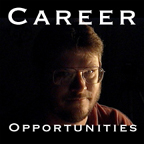Given my focus on computer consulting and writing, it always seems to amaze people when I tell them that my college degree is actually unrelated to either of these areas. I graduated from Bowling Green State University with a degree in — theater! That’s right, I did every possible job in the theater during my time in college. I was an actor, a dancer, a singer, lighting operator, stage manager and more. I think I spent more time in the theater than I spent in the classroom during my college years and even though I do not work in professional theatre now, I think that that time has had a direct and significant impact on my life and career ever since.
Podcast: Play in new window | Download
Subscribe: Apple Podcasts | RSS
Now available from Douglas E. Welch and Amazon.com
Cultivating Your Career Opportunities by Douglas E. Welch
11,000 Words
While we often talk about having one, monolithic, Reputation – with a capital R — I believe that there are a series of reputations that combine to create the whole. It is often said you can’t “do” projects, you can only do the individual tasks that make up the project. The same can be said for reputation. You don’t build your reputation as a whole, you cultivate the smaller reputations that create it. Each individual action builds your reputation in unique ways and each requires some thought as to how they relate to the whole. Cultivating Your Career Reputations examines each of these reputations in detail and helps you find specific areas where you can improve your work, your actions and your thoughts so that your overall professional reputation can grow
So much of your career — especially at the beginning — is about how you present yourself to others. If you present a confident, intelligent air, people will think of you as confident and intelligent. If, on the other hand, you enter the office for an interview staring at your shoes and mumbling, you set the wrong expectations from the start. No matter what you may be feeling — fear, anxiety, lack of confidence — you can and should “act” like you are fearless, calm and full of confidence.
Acting taught me how important it is to stand up straight and speak clearly so that the person in the last row can hear you. It taught me how to look someone in the eye and actually listen to them, as if I was hearing the lines for the very first time. Stage management taught me the importance of organization, working with others and managing them. I never realized how important this would be to my career outside of the theater.
Acting the part
Presenting yourself well isn’t about any sense of arrogance or excessive ego or pretense. Rather it is about presenting the best image of yourself possible. You shouldn’t necessarily believe that you are the perfect candidate for a job, but you can act like you think the perfect candidate would act. You can present your credentials and experience in the best light possible, even if you are just getting started in your career. You can give yourself every advantage in the interview process.
Later in your career, you will also see when acting the part can make a significant difference. There are days when the thought of training another person or troubleshooting another computer wears me down. Still, when I meet the client, I know that I need to “act” like the confident and friendly computer consultant that I am. What’s odd is that after a while, I find that I am no longer acting the part, but I have moved my thinking and my actions into a better place. Before I know it, I am no longer acting, I am simply working at my best.
There are many other areas when “acting the part” is especially important. Through the years in your career you will be asked to present on some idea, topic or project, though many people greatly fear public speaking. You see them every day literally shaking as they try to announce some new project or initiative at their company.
If you act the part it becomes much easier, and much more engaging, when you speak in public. I think this is one of the biggest advantages my theater experience has given me. I can stand up in front of people and talk on any number of topics off the top of my head without suffering the fear and anxiety that most people experience. This single ability has greatly helped me to stay employed, develop organizations and lead people for over 25 years. To be able to speak clearly in a situation where others would be fearful is greatly respected by others. It gives you an immediate advantage. You are seen as someone who has conquered a fear that most people have themselves and that raises the esteem of others. They can see that they would be scared in such a situation, so when you are not scared, they respect you all the more for that.
So, should all of you head over to the local acting school? Well, I certainly don’t think it would hurt, if my career is any indication. We can all use a bit of help in learning how to present ourselves better and communicate our ideas more clearly. Another option would be to find your local Toastmasters chapter. They approach public speaking a bit differently, but the results are much the same — presenting yourself well in public.
Communication is one of the most important aspects of any career and any skills that help you communicate more clearly would certainly be an advantage. “Acting the part” could be one way to raise yourself above the average careerist and give you one more important advantage in building the career that you deserve.
***



